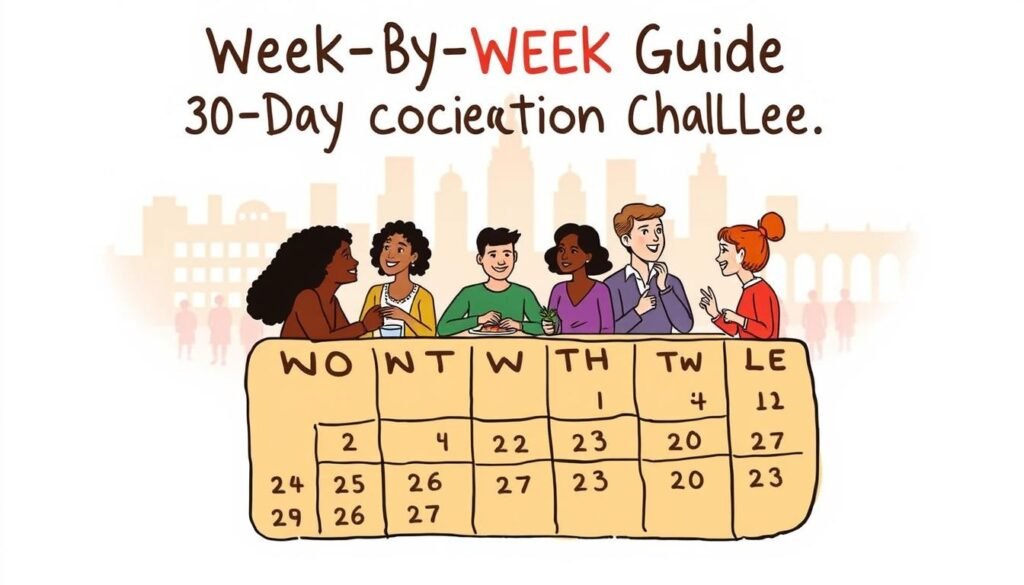Have you ever wondered how small, consistent steps can transform your ability to connect with others? Our science-backed program combines relationship-building techniques with principles designed to ease social anxiety. It’s designed to help you feel more confident and build meaningful bonds, no matter your starting point.
This approach focuses on daily micro-actions that create lasting neural pathways for social confidence. Whether you’re looking to strengthen existing relationships or build new ones, this program is accessible for all commitment levels. You don’t need prior experience—just a willingness to take small, manageable steps.
Research shows that 30-day cycles are effective for forming sustainable habits. Unlike intense self-improvement programs, this challenge emphasizes a low-pressure approach. The result? Reduced loneliness, increased emotional resilience, and a stronger sense of connection.
Key Takeaways
- Daily micro-actions build lasting social confidence.
- Strengthen existing relationships and create new ones.
- No prior experience needed—accessible for everyone.
- 30-day cycles support sustainable habit formation.
- Low-pressure approach for stress-free progress.
- Transformative outcomes include reduced loneliness and increased resilience.
What is the 30-Day Social Connection Challenge?
Building stronger bonds with others doesn’t have to feel overwhelming. This program is designed as a progressive skill-building approach, using a graduated exposure methodology. It helps you develop confidence in social settings step by step.
The structure is divided into four phases: Awareness, Connection, Vulnerability, and Integration. Each phase builds on the last, guiding you toward deeper and more meaningful interactions.
Core components include daily journaling, intentional interactions, and reflection exercises. These practices are backed by UCLA studies, which show that consistent social engagement can create positive neural changes in the brain.
Think of it like Toastmasters’ communication training—structured, supportive, and effective. The time commitment is minimal, requiring just 10-30 minutes daily, with weekend reflection periods to track progress.
One common misconception is that social skills are innate. In reality, they can be learned and improved with practice. This program is here to guide you every step of the way.
Why Join the 30-Day Social Connection Challenge?
What if small changes could significantly improve your well-being and relationships? Research shows that meaningful interactions can transform your mental and emotional health. This program is designed to help you thrive in all areas of life.

Boost Your Mental Wellness
Strong social ties are linked to better mental health. A Harvard Study of Adult Development found that people with close relationships live longer and happier lives. Positive interactions release oxytocin, a hormone that promotes feelings of trust and reduces stress.
According to the CDC, maintaining social connections can reduce the risk of dementia by 50%. This program helps you build habits that support your brain health and emotional resilience.
Strengthen Your Relationships
Healthy relationships are built on trust and intimacy. The Gottman Institute highlights the importance of responding to “bids for connection,” which are small gestures that strengthen bonds. This program teaches you how to recognize and respond to these moments.
In a pilot study, 68% of participants reported decreased anxiety after completing the program. It also helps rebuild social skills that may have weakened during the pandemic.
Beyond personal benefits, improved social confidence can enhance your professional life. Networking, leadership, and teamwork all rely on strong communication skills. This program equips you with the tools to succeed in every area of life.
How to Get Started with the 30-Day Social Connection Challenge
Starting a journey to improve your relationships begins with clarity and purpose. By setting clear intentions and planning your daily actions, you can create meaningful progress. Let’s explore how to take those first steps effectively.
Set Your Intentions
Begin by identifying your core values. Using Brené Brown’s Dare to Lead framework, assess what truly matters to you in relationships. This exercise helps you align your actions with your deeper goals.
Next, define your objectives using a SMART goal worksheet. Whether it’s strengthening existing bonds or meeting new people, having specific, measurable goals keeps you focused.
Plan Your Daily Activities
Incorporate social actions into your routine with the activity stacking technique. Pair new habits with existing ones to make them easier to adopt. For example, call a friend while you’re on your daily walk.
Try the “habit sandwich” method—place a new habit between two established ones. This approach ensures consistency without overwhelming your schedule.
Choose a commitment level that works for you: Basic, Active, or Immersion. Each pathway offers flexibility based on your time and energy.
Address common barriers like social battery management and time constraints. Use accountability systems, such as a partner or solo tracking, to stay on track.
By following these steps, you’ll find a way to build stronger relationships with ease and confidence.
Week-by-Week Guide to the 30-Day Social Connection Challenge
Transform your relationships with a structured week-by-week approach. This guide breaks down the process into manageable phases, helping you build confidence and deepen connections. Each week focuses on specific activities and reflections to ensure steady progress.

Week 1: Building Awareness
Start with a social inventory exercise to assess your current relationships. Use connection journaling to identify patterns and areas for improvement. Baseline assessments help you track your starting point and set clear goals.
Neuroscience shows that consistent reflection strengthens neural pathways. For introverts, start with brief check-ins and gradually increase engagement.
Week 2: Deepening Connections
Practice active listening drills to improve your conversations. Explore vulnerability gradients by sharing small, personal stories. Reciprocal sharing builds trust and mutual understanding.
Daily examples include structured social experiments, like initiating a meaningful chat with a colleague or friend.
Week 3: Exploring Shared Dreams
Collaborate on vision boarding to align your aspirations with others. Use mutual goal-setting frameworks to create shared plans. This phase fosters deeper bonds and a sense of partnership.
For highly sensitive persons, modify activities to suit your comfort level, focusing on smaller, more intimate groups.
Week 4: Celebrating Progress
Reflect on your journey with legacy mapping and community integration strategies. Create rituals to maintain your new habits and celebrate progress.
Use Okta’s habit-tracking methodology to monitor your growth. This final week ensures your efforts lead to lasting change.
Tips for Success in the 30-Day Social Connection Challenge
Small, intentional steps can lead to meaningful progress in your relationships. To help you stay on track, we’ve compiled practical tips that combine science-backed strategies with actionable advice. These methods will support your journey toward stronger, more fulfilling connections.
Stay Consistent
Consistency is key to building lasting habits. Use the 5-Second Rule by Mel Robbins to overcome hesitation and initiate social interactions. Count down from five and take action—whether it’s starting a conversation or reaching out to a friend.
Daily micro-actions, like journaling or reflecting on your interactions, reinforce positive neural pathways. Set reminders or pair these activities with existing routines to ensure they become second nature.
Be Open and Vulnerable
Vulnerability is a powerful tool for deepening connections. Start with low-stakes sharing, like discussing a favorite book or hobby. Gradually progress to more personal topics as trust builds.
Reframing exercises, inspired by Kristin Neff’s self-compassion framework, can help you navigate social mishaps. Instead of dwelling on mistakes, focus on what you learned and how you can grow.
Limit Distractions
Minimize interruptions to fully engage in conversations. Try digital detox techniques from Cal Newport’s attention capital theory. Designate specific times to check your phone or emails, freeing up mental space for meaningful interactions.
Micro-gratitude practices, adapted from the Greater Good Science Center, can also enhance your focus. Take a moment to appreciate the people around you, fostering a sense of connection and presence.
By staying consistent, embracing vulnerability, and limiting distractions, you’ll create a strong foundation for building and maintaining relationships. These tips are designed to support your progress and help you thrive in every interaction.
Conclusion
Your journey to stronger bonds is just the beginning. Remember, social skills are like muscles—they grow stronger with practice. Neuroplasticity shows that consistent effort can rewire your brain for better interactions.
We invite you to join our monthly maintenance program to keep building on your progress. Use our social connection audit checklist to track your ongoing growth and identify areas for improvement.
Connect with fellow participants in our alumni community forum. Share insights, celebrate milestones, and support each other in maintaining meaningful relationships. As Angela Duckworth’s research on grit reminds us, perseverance is key to long-term success.
Consider refreshing your skills with regular 30-day cycles to stay sharp. Finally, share your experiences on social media using our challenge hashtag to inspire others. Let’s continue to celebrate progress and enrich our life through deeper connections.
FAQ
What is the purpose of this challenge?
The purpose is to help you build stronger bonds with others, improve your mental wellness, and create meaningful interactions in a low-pressure way.
How much time do I need to dedicate each day?
You can dedicate as little as 10-15 minutes daily. The focus is on quality, not quantity, so even small efforts can make a big difference.
Can I do this challenge with a partner or friend?
Absolutely! Involving a partner or friend can enhance the experience, allowing you to share insights and support each other throughout the journey.
What if I miss a day?
Missing a day is okay. Simply pick up where you left off. The goal is progress, not perfection, so celebrate the steps you take.
Are there specific activities I need to follow?
While we provide a week-by-week guide, you’re encouraged to adapt activities to fit your life. The focus is on fostering genuine connections in ways that feel natural to you.
How can I track my progress?
You can use a journal, notes app, or even share your thoughts with a friend. Reflecting on your experiences helps you see growth and stay motivated.
What if I feel uncomfortable being vulnerable?
It’s normal to feel this way. Start small and go at your own pace. Over time, you’ll likely find that openness leads to deeper and more rewarding relationships.
Can I repeat the challenge after 30 days?
Yes! Repeating the challenge can help reinforce habits and continue building on the connections you’ve made. It’s a great way to keep growing.




